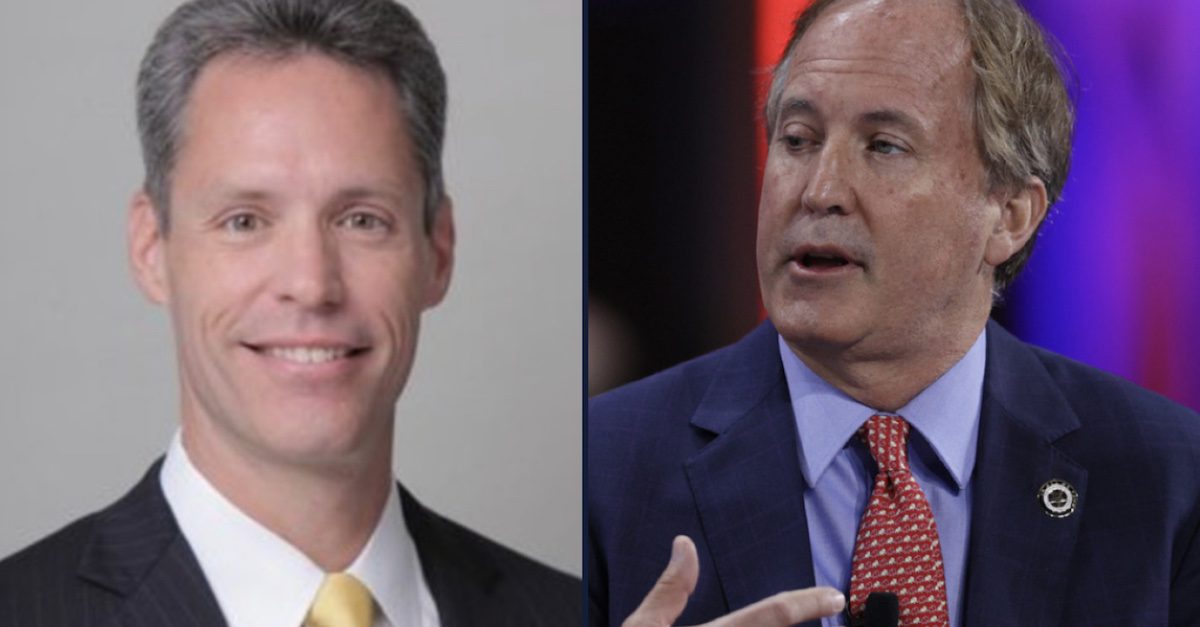

U.S. District Judge Drew Tipton (L) (U.S. District Court for the Southern District of Texas), Ken Paxton (R) (via Joe Raedle/Getty Images)
The Judicial Conference of the United States, which governs the federal court system, has announced a significant step to limit 'judge shopping' for sweeping injunctions from friendly one-judge divisions on important issues.
Although the announcement indicated concerns about 'judge shopping' in patent cases, it was discovered that this practice was affecting federal civil courts more broadly.
Specifically, the Judicial Conference wants to prevent litigants from choosing judges they believe will approve requests for declaratory judgments and/or injunctive relief, so that case assignments on such matters are actually random. This would likely lead to fewer cases being taken to the U.S. Supreme Court just to be overturned later..
The problem arises in Texas and other areas where there are divisions with only one judge, making random assignment impossible in some cases.
For example, the Biden administration accused Texas Attorney General Ken Paxton of 'judge shopping' by suing in a division where only U.S. District Judge Drew Tipton presides, and Tipton had previously made a controversial grant of a nationwide injunction that was later overturned by the Supreme Court. only U.S. District Judge Drew Tipton presides over civil cases. Tipton, a Donald Trump appointee, was once criticized for making an “unprecedented and outrageous” grant of a nationwide injunction blocking ICE’s enforcement priorities — and SCOTUS went on to overturn that ruling.
More Law&Crime coverage: Judge says there’s ‘nothing more than rank judge-shopping’ while stepping aside from Disney case
Although the court rejected DOJ’s attempt to transfer the case from Tipton’s court, the request said Paxton’s office “admitted” filing in the Victoria Division was no accident.
“The case is being filed in Victoria, quite frankly, Your Honor, because of our experience with you,” the AG’s office told Tipton in court, when explaining why the suit wasn’t filed in Houston, other major metropolitan areas, or in the division along the Southern border.
Next, the DOJ commented directly on the “judge shopping” issue that the Judicial Conference sought to address, noting that more than a dozen cases against the government were filed in divisions where the plaintiffs knew the judge would be “pre-determined”:
That concern is magnified where, as here, Plaintiffs circumvent the random assignment system by never filing in Divisions where they have a non-trivial chance of not knowing what judge they are likely to be assigned. As explained, this is not the first time that Texas has gamed the local rules governing case assignments. In fact, all 28 of the State’s lawsuits against the federal government filed in Texas federal district courts have been filed in just seven Divisions where local rules severely limit the number of judges to whom the cases could be assigned (Victoria, Amarillo, Galveston, Lubbock, Tyler, Fort Worth, Midland), including 18 lawsuits in Divisions where the case would necessarily be assigned to a single, pre-determined judge (Victoria, Amarillo, Galveston, Midland), and no less than seven here in Victoria.
The Biden administration previously raised the same kinds of complaints about “judge shopping” in Amarillo and Lubbock divisions, where U.S. District Judge Matthew Kacsmaryk and U.S. District Judge James Wesley Hendrix sit respectively and hear the most civil cases, on important issues like access to abortion pills or a government funding bill worth trillions of dollars. Both judges were chosen by Trump.
Previously, Ken Paxton’s office referred to as the “judge shopping” criticism a “baseless smear,” the Judicial Conference has now approved anti-judge shopping policy that will apply to civil cases seeking to prevent or compel state or federal actions, whether through declaratory judgment or any form of injunctive relief — the same types of cases that Paxton has often filed against the Biden administration.
